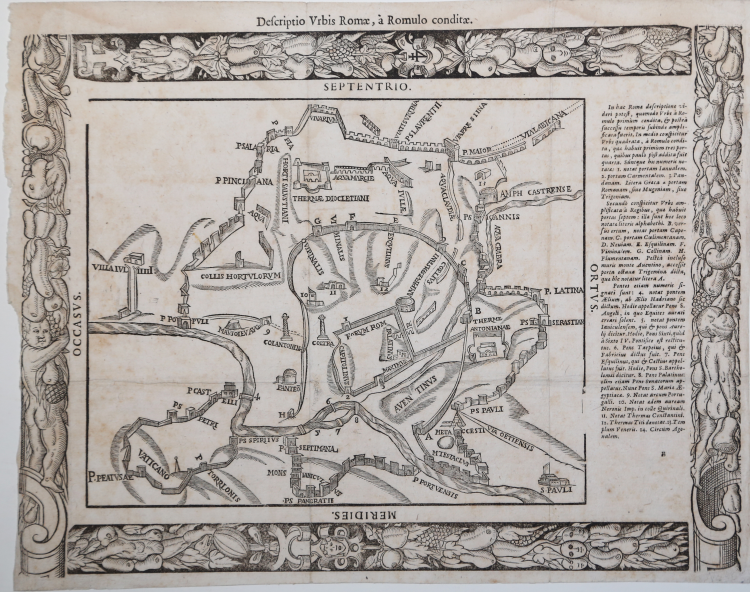



| Reference: | S38302 |
| Author | Thomas Dempster |
| Year: | 1612 |
| Zone: | Rome |
| Printed: | Ginevra |
| Measures: | 364 x 287 mm |


| Reference: | S38302 |
| Author | Thomas Dempster |
| Year: | 1612 |
| Zone: | Rome |
| Printed: | Ginevra |
| Measures: | 364 x 287 mm |
Map of ancient Rome; vertical projection with elevation. Among the few monuments reproduced some are recent, such as the tower of Niccolò V in the Vatican, the basilica of S. Paolo, the villa of Giulio III (built between 1551-1553). Oriented with North to the left.
This map is originally inserted, folded, by Bernardo Gamucci in his "Libri quattro dell’antichità della città di Roma raccolte sotto brevità da diversi antichi et moderni scrittori”, first edition published in Venice, Varisco & Compagni, in 1565.
The same map, with various errors in the toponyms, with the addition of the decorative frame and the Latin text, is also included in the update of the work by Johannes Rosinus (Johann Rossfeld) "Antiquitatum Romanorum corpus absolutissimum ..." (1st edition 1585) published by Thomas Dempster, printed in Geneva in 1612 by Samuel Chouët, who went through various editions (1613, 1620, 1632, 1645, 1662, 1701, 1743).
The map printed by Dempster is created by a new wood block, enriched by an ornamental border of Nordic style.
Woodcut, traces of editorial folds, in excellent condition. Rare.
|
cfr. Frutaz XVIII, Tav. 35; Scaccia Scarafoni, p. 26, n. 16.
|
Thomas Dempster (Scozia, a Cliftbog, presso Aberdeen, 1579 -Bologna, 1625)
|
was a Scottish scholar and historian. Born into the aristocracy in Aberdeenshire, which comprises regions of both the Scottish highlands and the Scottish lowlands, he was sent abroad as a youth for his education. The Dempsters were Catholic in an increasingly Protestant country and had a reputation for being quarrelsome. Thomas' brother James, outlawed for an attack on his father, spent some years as a pirate in the northern islands, escaped by volunteering for military service in the Low Countries and was drawn and quartered there for insubordination. Thomas' father lost the family fortune in clan feuding and was beheaded for forgery.
For these and political and religious reasons in these often violent Elizabethan times Thomas was unable to come home except for visits. Of uncommon and impressive height and intellectual ability he became an itinerant professor in France and Italy, driven from place to place by a series of colourful personal incidents in which he fought duels or opposed officers of the law. He eventually found refuge and patronage under Grand Duke Cosimo II of Tuscany, who commissioned a work on the Etruscans. Three years later Thomas handed the duke a magnum opus, the manuscript of De Etruria Regali Libri Septem, "Seven Books about Royal Etruria",in the Latin language, the first detailed study of every aspect of Etruscan civilisation, considered a brilliant work. In 1723 Thomas Coke finally undertook to publish an enhanced edition of it. The original manuscript remains in Coke's library at Holkham.
|
|
cfr. Frutaz XVIII, Tav. 35; Scaccia Scarafoni, p. 26, n. 16.
|
Thomas Dempster (Scozia, a Cliftbog, presso Aberdeen, 1579 -Bologna, 1625)
|
was a Scottish scholar and historian. Born into the aristocracy in Aberdeenshire, which comprises regions of both the Scottish highlands and the Scottish lowlands, he was sent abroad as a youth for his education. The Dempsters were Catholic in an increasingly Protestant country and had a reputation for being quarrelsome. Thomas' brother James, outlawed for an attack on his father, spent some years as a pirate in the northern islands, escaped by volunteering for military service in the Low Countries and was drawn and quartered there for insubordination. Thomas' father lost the family fortune in clan feuding and was beheaded for forgery.
For these and political and religious reasons in these often violent Elizabethan times Thomas was unable to come home except for visits. Of uncommon and impressive height and intellectual ability he became an itinerant professor in France and Italy, driven from place to place by a series of colourful personal incidents in which he fought duels or opposed officers of the law. He eventually found refuge and patronage under Grand Duke Cosimo II of Tuscany, who commissioned a work on the Etruscans. Three years later Thomas handed the duke a magnum opus, the manuscript of De Etruria Regali Libri Septem, "Seven Books about Royal Etruria",in the Latin language, the first detailed study of every aspect of Etruscan civilisation, considered a brilliant work. In 1723 Thomas Coke finally undertook to publish an enhanced edition of it. The original manuscript remains in Coke's library at Holkham.
|